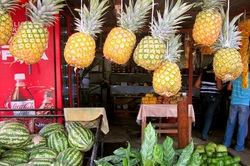The experience of a homestay, living with a family in a different country, speaking a different language, is quite unlike anything else in the world. Yes, you spent a night or two at a friend’s or family member’s house, or maybe you’ve traveled and stayed in hotels in other parts of the world, where English is not the predominant language, but these things more than pale in comparison to a homestay.
I can vividly recall waiting to be dropped off at our respective homes, the feelings of not only worry but shock and perhaps dread; I was to be the last person dropped off, and while seeing my classmates being greeted by their smiling, welcoming families should’ve reassured me, I was convinced that my family would not be similar.
Suddenly, our route changed, and I was not last but next. The suspense (to be cliché) was killing me, and leaving the familiar faces of my friends- physically getting up off the seat in the back of the bus, picking up my bags, and walking to the front door- was an unexpected challenge, and I may or may not have been internally hyperventilating as I walked towards the strangers I would live with for the next two weeks.
What was not a challenge, happily, was to smile back at the friendly faces of mi familia tica. My host mom guided me throughout the house, giving me a tour and introducing me to the rest of the fam, and left me to arrange my room, a beautiful, comfortable space, and gather my thoughts and freshen up.
I distinctly remember sitting on the bed, leading myself in slow, deep breathing, realizing that, for better or worse, I would be spending the next two weeks with this family.
For all of my fears, my homestay experience was more rewarding and enjoyable than I ever could’ve imagined. I was able to bond with my little brothers Luis and Oscar, my sister Andrea, and my parents Aydée and Oscar though games of fútbol and Rummikub, and discussions of the community of Santa Elena, the education and health system of Costa Rica, coffee production, the family farm in Carñitas, the Costa Rican government, conservation efforts, the importance of organics and limiting chemical use on farms, and so much more. We bonded on so many levels, through so many different means, and I was also able to meet and connect with the families of my friends, all of whom were wonderful and friendly people, genuinely interested in sharing their lives and experiences with us.
While our conversations were beyond instructive, for me actually living with a family was the best part. By living with a family, you are thoroughly pushed out of your comfort zone into an entirely new way of life. It is your task to overcome your feelings of culture shock to embrace a new ideology and learn as much as you can. Immersion into a new language, a new culture, and a new family has given me a new, fresh perspective on life, here with mi familia tica, in the States with my family, and at Vandy with my college family.
Laura M.
I can vividly recall waiting to be dropped off at our respective homes, the feelings of not only worry but shock and perhaps dread; I was to be the last person dropped off, and while seeing my classmates being greeted by their smiling, welcoming families should’ve reassured me, I was convinced that my family would not be similar.
Suddenly, our route changed, and I was not last but next. The suspense (to be cliché) was killing me, and leaving the familiar faces of my friends- physically getting up off the seat in the back of the bus, picking up my bags, and walking to the front door- was an unexpected challenge, and I may or may not have been internally hyperventilating as I walked towards the strangers I would live with for the next two weeks.
What was not a challenge, happily, was to smile back at the friendly faces of mi familia tica. My host mom guided me throughout the house, giving me a tour and introducing me to the rest of the fam, and left me to arrange my room, a beautiful, comfortable space, and gather my thoughts and freshen up.
I distinctly remember sitting on the bed, leading myself in slow, deep breathing, realizing that, for better or worse, I would be spending the next two weeks with this family.
For all of my fears, my homestay experience was more rewarding and enjoyable than I ever could’ve imagined. I was able to bond with my little brothers Luis and Oscar, my sister Andrea, and my parents Aydée and Oscar though games of fútbol and Rummikub, and discussions of the community of Santa Elena, the education and health system of Costa Rica, coffee production, the family farm in Carñitas, the Costa Rican government, conservation efforts, the importance of organics and limiting chemical use on farms, and so much more. We bonded on so many levels, through so many different means, and I was also able to meet and connect with the families of my friends, all of whom were wonderful and friendly people, genuinely interested in sharing their lives and experiences with us.
While our conversations were beyond instructive, for me actually living with a family was the best part. By living with a family, you are thoroughly pushed out of your comfort zone into an entirely new way of life. It is your task to overcome your feelings of culture shock to embrace a new ideology and learn as much as you can. Immersion into a new language, a new culture, and a new family has given me a new, fresh perspective on life, here with mi familia tica, in the States with my family, and at Vandy with my college family.
Laura M.
